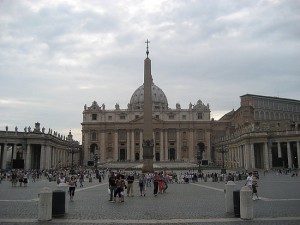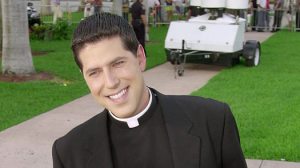I may owe the Pope an apology.
I’ve been critical of the Catholic Church and its stranglehold on Hispanic culture. It seems to me that religious dogma is a big reason why Latin America can’t dig out of its poverty-lined hole and, furthermore, why U.S. Hispanics are constantly scraping by for political, economic, and sociological power.
Well, I’m not rescinding any of that. But I am wondering if there is a bright side to overreliance on the Vatican.
You see, I recently wrote about the U.S. government’s fear that al-Qaida is trying to recruit American Latinos to its sick cause. The terrorist group supposedly thinks Hispanics can “move in and around the United States without arousing suspicion,” making it easier to execute crazy shit like setting off bombs.
However, there is no hard proof that this strategy is underway. As such, I have to wonder if al-Qaida has found it difficult to shake the Catholicism out of Hispanics.
I’ve written before about the powerful bonds between Latino culture and the Catholic Church. The Hispanic predilection to believe in a big guy in the sky is well-documented.
U.S. government officials are worried that it is at the “intersection with prison radicalization, gang culture, religious zealotry that you have a potential problem.”
This seems like quite a jump in logic. Yes, Latinos are overrepresented in American prisons, and gang imagery is unfortunately as big an albatross in Hispanic culture as it is in African American society.
But is religious zealotry more potent in Latinos than it is among, say, white evangelicals or African American Baptists? Why would believing in the Catholic doctrine make Hispanics more likely to convert to radical Islam?
And while we’re at it, why haven’t we seen terrorists from Latin America like we have from the Middle East? Indeed, residents of Latin America have more reason than most of the world to hate the United States. Our support for the region’s brutal dictatorships and/or drug-running rebels (whichever is convenient) has been so blatant that even jingoists don’t bother to lie about it.
And yet, citizens of Latin America don’t talk about exacting revenge on the United States or waging war. Far from it — they love the opportunities that the United States offers so much that many of them are willing to risk their lives to start over here.
Certainly the commonality, proximity, and shared history of the cultures have something to do with it. To people in Latin America, the United States isn’t some exotic, evil land over the ocean. They probably have family members who live here.
And similarly, it’s difficult to fire up a religious war when most residents in this hemisphere are some form of Christian. So again, is one factor for the absence of Latin American terrorists the prevalence of Catholicism in the culture? And might this strong faith be a hindrance to recruiting American Latinos for jihad?
Of course, I have no evidence for this thesis. I’m like the U.S. government that way. Still, I’m willing to give the Pope the benefit of the doubt and say that Latinos’ obsession with Jesus is one reason there aren’t a lot of Jose Padillas out there.
So score one for the Catholic Church. Now, if they would just listen to some modern ideas about birth control…











